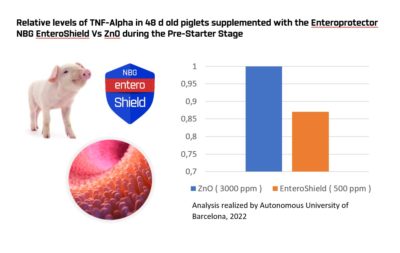Tumour Necrosis Factor (TNF-Alpha)

Dear colleagues,
Years ago, one of the few tools we had to objectively assess improvements in the intestinal health of farm animals was intestinal mucosa histology, an invasive technique that required the slaughter of animals and evaluated the relationship between villus length and crypt depth. Since then, we have improved techniques to develop tools such as gene expression, which show the animal’s health status quite accurately, However, gene expression itself measures the expression of several biomarkers that assess the animal’s intestinal health, inflammatory status and metabolic stress, such as interleukin-1beta, interleukin-6, Pig-Map, C-reactive protein and TNF-alpha (tumour necrosis factor alpha).
This week we wanted to review the characteristics of one of the biomarkers that has helped us most throughout many developments: TNF-alpha.
TNF-alpha is an inflammatory cytokine produced by macrophages, lymphocytes, mast cells, and neutrophils when activated by interleukin 1 or bacterial endotoxins. It is also produced as a transmembrane protein, as well as by smooth muscle cells in response to injury.
The main functions of this cytokine are to signal cell apoptosis, indicating which cells should be destroyed, and to stimulate the secretion of other pro-inflammatory molecules.
These actions are important both for fighting pathogens and eliminating cancer cells, but the immune response is based on balance. Therefore, if we have an infection and/or chronic tissue inflammation, for example during intestinal malabsorption syndrome, we will have unjustifiably high levels of TNF-alpha and other pro-inflammatory factors that will affect the inflammatory state of the entire body.
In addition, TNF-alpha (also known as cachectin) decreases the animal’s appetite and increases CRH levels, which ultimately also increases cortisol and adrenaline levels in the blood, with all that this entails, such as immunosuppression and protein catabolism.
Another factor to consider is that inflammation and elevated levels of TNF-alpha in the gut impair nutrient absorption, for example:
– Elevated levels of TNF-alpha decrease the receptor necessary for vitamin C absorption.
– Elevated levels of TNF-alpha decrease the expression of butyrate transporters.
– Phosphate absorption decreases when TNF-alpha is elevated in the intestines.
Unusually high and constant levels of TNF-alpha indicate impaired intestinal health with a tendency towards immunosuppression, dysbiosis and malabsorption syndrome.Tener niveles inusualmente altos y constantes de TNF-alfa indica una salud intestinal deteriorada con tendencia a la inmunosupresión, la de-biosis y el síndrome de malabsorción.
As the cover of this article, we are pleased to present an analysis by the Autonomous University of Barcelona comparing TNF-alpha levels in piglets that consumed our enteroprotector NBG EnteroShield versus an enteroprotector of undisputed potency, zinc oxide, at a dose of 3000 ppm during the pre-starter stage.
Although the positive effect of zinc oxide on intestinal health is indisputable… our product surpasses its effect at the productive and metabolic levels.
Finally, we have attached an interesting article that reviews the role of TNF-alpha in intestinal health.
Enjoy the article.

